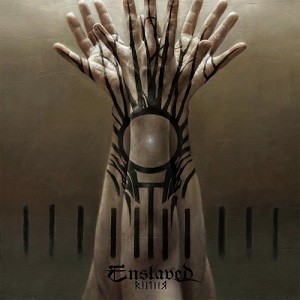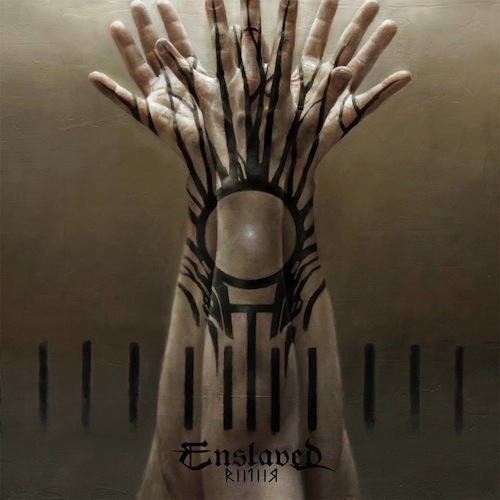Fourteen years posting a year-end list somewhere, and the rule never changes: odd-numbered years produce more good music. Thankfully, we just concluded 2015. 🙂
15. Deafheaven – New Bermuda
14. Peste Noire – La Chaise-Dyable
13. Mgła – Exercises in Futility
12. Veilburner – Noumenon
11. Botanist – Hammer of Botany
10. Enslaved – In Times (track: Building With Fire)
It’s amazing that after 24 years and 13 studio albums, Enslaved still routinely make it into my year-end top 10. They have continually evolved without letting go of their black metal roots, and the consequence lately has been a long stretch of memorable, prog-rock infused releases that keep up with the times and never grow stale no matter how often I resurrect them. If In Times won’t stick with me quite so permanently as Vertebrae in 2008, it still achieves everything I’ve come to expect of them lately and has managed to entertain me more than the vast majority of other albums I have heard this year. I think I have a bit of a subconscious inclination to prioritize newer bands, but #10 was as low as I could justify dropping this one.
9. Krallice – Ygg Huur (track: Wastes of Ocean)
Like any Krallice album, Ygg Huur takes dozens of listens to ingest. What struck me at first as a rather disappointing, spastic blathering of sound comes together much more coherently if you give it its due time. That being said, it is still a sharp break from their previous four albums, and it lacks that element of progression and overarching vision that has traditionally made this band, for me at least, infinitely repeatable. (I have listened to Krallice more than any other band in my life by a large margin, and they only came into existence in 2008.) Ygg Huur is a brief an meandering mood piece that does not, perhaps, maximize the band’s song-writing talents, but I’ve enjoyed it plenty never the less. More avant-garde than post-black metal, am I allowed to love it and still hope it was just a one-time experiment?
8. Ghost Bath – Moonlover (track: Golden Number)
This is a pretty gorgeous post-black metal album that I’m surprised more sites haven’t picked up on for their year-end summaries. It lacks a touch of refinement that might have earned it higher standing, but the song writing is fabulous. Moonlover delivers a well-rounded package of post-rock infused metal that seems to pay a good deal of respect to Alcest and Amesoeurs, but their undertone is bleak and depressing. It’s a sad album in a way that makes me think of Harakiri for the Sky’s Aokigahara last year, but peppered with little bursts of joy that will bring a smile to your face.
Oh yeah, metal’s not supposed to make me smile. Check.
7. Sumac – The Deal (track: Thorn In The Lion’s Paw)
I never really got into Old Man Gloom. Make what you will of that. The Deal certainly wasn’t Aaron Turner’s most well-received album, but I personally enjoyed it more than anything he’s contributed to since Oceanic. A lot of that has to do with Nick Yacyshyn’s brilliant mastery of the drum set, but I also feel like Turner’s chugging out riffs that really sink into my head more than I’m used to. It’s like a doom metal reinterpretation of Isis, albeit with less progression, and I love the subtle stylistic diversity he brings to the field on this one. It has moments that remind me of everything from black metal to Converge. (And it probably wins this year’s ‘most listened to in my car’ award. <_<)
6. A Forest of Stars – Beware the Sword You Cannot See (track: Virtus Sola Invicta)
Beware the Sword You Cannot See is one of the most eclectic albums I have heard in a long time that I still managed to really enjoy. If I could begin to put a finger on how to describe it, I would have reviewed it ages ago. Black metal at its heart, it weaves a wild mix of strings and spoken word and avant-garde breaks around that core. I like it, quite a bit, and I think the vocals and lyrics (at least, what I can make of them) might be its strongest selling point. I really don’t know what to say about this album. Hear it for yourselves, and be prepared to give an attentive listen–possibly many–if you want to soak it all in.
5. Blind Guardian – Beyond the Red Mirror (track: Grand Parade)
It’s pretty hard to measure the worth of an epic power metal band on a list that is heavily dominated by innovative new styles of music. I don’t think I would have felt entirely comfortable with my positioning of this album no matter where I put it, but I tried to make the cutoff a sort of drifting point between albums that really made me reflect and albums that I just really enjoyed, because there’s never going to be a particularly deep hidden truth to a Blind Guardian track, but they’ve proven a dozen times over to be the ultimate kings of all fantasy-themed music. In the broad scheme of BG’s vast discography, I would probably place Beyond the Red Mirror fourth, after Nightfall in Middle-Earth, At the Edge of Time, and A Night at the Opera. That translates roughly to: it’s awesome.
4. Bosse-de-Nage – All Fours (track: A Subtle Change)
Am I a little biased since I got my initial rip of this direct from frontman Bryan Manning? Probably not, but in my weird little world that’s still a bragging point. 😉 Like Cara Neir’s Portals to a Better, Dead World in 2013, All Fours takes everything I love about screamo and turns it into post-black metal. This might be a coincidence. I’m pretty sure the band claims no direct screamo influence (don’t quote me on that), but the consequence is the same. These guys have worked their way into the top-tier of bands pushing metal in new directions today, and, more so than their previous albums, All Fours really strikes me as a well-rounded composition that possesses the maturity to fully deliver its vision. And Manning has a way with lyrics that’s… well… you just have to read them.
3. Obsequiae – Aria of Vernal Tombs (track: Orphic Rites Of The Mystic)
When I first heard Obsequiae, it was one of those rare moments where I went a-ha, you are that band that’s going to pioneer the style I have always desired but been too inept to create myself. I can guarantee you without much doubt that, of all of the albums of 2015, Aria of Vernal Tombs will find its way into my playlist the most for the longest period of time. Ten years from now, I will probably still be listening to this album when its competitors are all but distant memories. Like Summoning, they fit a unique mood for me that no other band has really begun to approach. (Perhaps Opeth’s Orchid crosses into this terrain, briefly and insufficiently.) A collection of captivating medieval melodies that press themselves upon you by-and-large through euphorically well-mixed guitar and bass (the bass on this album is absolutely gorgeous) rather than traditional instrumentation… my god, I’ve been waiting so long for a band that sounds like this, and they’re easily my favorite new discovery of the year.
2. Panopticon – Autumn Eternal (track: The Wind’s Farewell)
It’s amazing to think that, in the absence of one album this year that won my heart in a landslide, Panopticon could have taken my #1 slot in 3 out of the last 4 years. To put it bluntly, Autumn Eternal is Austin Lunn’s best album to date, and Austin Lunn is arguably the most accomplished metal artist of the 2010s. An incredibly versatile musician who can sample uninhibited from the melting-pot of styles that is post-black metal, Lunn’s newest offering is a mindblowing amalgamation of post-rock and black metal that leaves the more popular bands of this persuasion choking on his dust.
1. Liturgy – The Ark Work (track: Kel Valhaal)
What can I say…. it didn’t make Pitchfork’s top 25? I will probably look back on The Ark Work as one of the most underrated albums ever recorded, and I think its merits have more in common with Radiohead than with anything that has ever derived from heavy metal. It constantly threatens to collapse into a blundering mire of amateur garbage, from the excessive bell tones to Hunter’s marshmallow-mouthed rap vocals. This might be the turn-off for so many listeners, but it is necessary, and the key to this album is in how Liturgy always manage to somehow hold it together. It’s the musical equivalent of your kindergartener handing you a crayon scribble that, on second glance, turns out to be a Picasso.
On Aesthethica, Liturgy explored a very explicit reinterpretation of black metal that found quite a bit of inspired company among bands who were beginning to recognize and explore the similarities between black metal and post-rock. That album helped to define a movement, but it only achieved the band’s vision in a very direct sort of way: through rhythm and melody and progression. The Ark Work nails Hunter’s vision home with an extremely more robust and precise pallet, bringing lyrics and glitch effects and atypical instrumentation and a totally unorthodox approach to metal vocals into the fray. If you listen to a track like “Vitriol” and can barely take it seriously, that’s part of the point, but barely is the key word. Every risk and gamble they take ultimately works, and I am unabashedly unashamed to blare Hunter’s trap beat ‘occult rap’ at max volume out my car stereo. 😀
You might listen to The Ark Work and hear some childish clusterfuck, but I hear absolutely brilliant attention to detail–a musician completely in control of the degree to which his work teeters on the brink of nonsense. Top 20 all-time contender? I could go there. Leave your fear of speaking too fondly of Hunter Hunt-Hendrix at the door and just embrace this album with the assumption that he knew exactly what he was doing. You won’t be disappointed.
Previous years on Shattered Lens:






